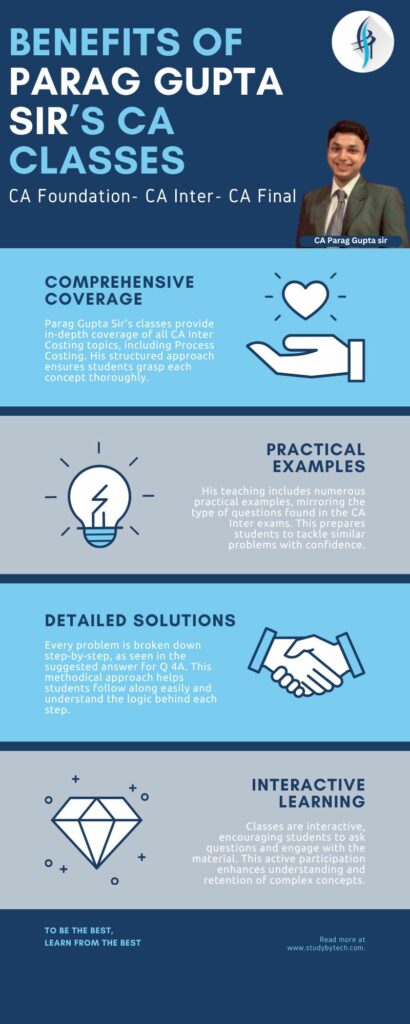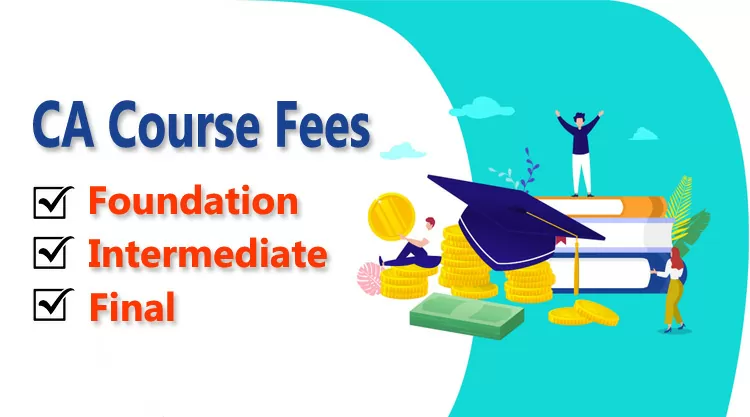Introduction to CA Inter Costing Classes by Parag Gupta Sir
Parag Gupta Sir is renowned for his exceptional CA Inter Costing classes. With a focus on comprehensive understanding and practical application, his teachings ensure students excel in their exams. One of the critical components of the CA Inter May 24 Costing paper is Process Costing, specifically Question 4A. This blog delves into the suggested answer for this question, providing insights that align with Parag Gupta Sir’s teaching methodology.
Understanding Q-4a Process Costing in CA Inter May 24 Costing
Process Costing is a method used in industries where production is continuous, and the products pass through multiple stages or processes. It accumulates costs for each process and assigns them to units produced. This method is crucial for industries like chemicals, textiles, and oil refining.
Key Components of Process Costing
- Process Account: Records the costs incurred in each process.
- Normal and Abnormal Losses: Differentiates between expected losses and unexpected, non-recurring losses.
- Equivalent Units: Calculates the cost of partially completed units.
- Cost Allocation: Distributes costs among completed and incomplete units.
Step-by-Step Solution
- Identify Costs: Collect data on raw materials, labor, and overheads for each process.
- Calculate Total Costs: Sum the costs for each process, including both direct and indirect costs.
- Determine Equivalent Units: Evaluate the number of units partially completed at each stage.
- Allocate Costs: Distribute the total costs to completed units and work-in-progress based on equivalent units.
Example Problem Breakdown
Given Data:
- Total raw materials for Process 1: ₹50,000
- Labor costs for Process 1: ₹20,000
- Overhead costs for Process 1: ₹10,000
- Normal loss for Process 1: 5% of input
Calculation:
- Total Cost for Process 1:
- Total Cost=Raw Materials+Labor+Overheads=50,000+20,000+10,000=₹80,000
- Total Cost=Raw Materials+Labor+Overheads=50,000+20,000+10,000=₹80,000
- Normal Loss:
- Normal Loss=5% of Input Units
- Normal Loss=5% of Input Units
- Equivalent Units:
- Equivalent Units=Units Completed+(Units in Process×Percentage Completion)
- Equivalent Units=Units Completed+(Units in Process×Percentage Completion)
- Cost Allocation:
- Cost per Equivalent Unit=Total CostEquivalent Units
- Cost per Equivalent Unit=
- Equivalent Units
- Total Cost
By applying these calculations, students can accurately allocate costs and understand the intricacies of Process Costing.
Click here to see the all suggested answer for CA Inter May 24
Benefits of Parag Gupta Sir’s Classes

Comprehensive Coverage
Parag Gupta Sir’s classes provide in-depth coverage of all CA Inter Costing topics, including Process Costing. His structured approach ensures students grasp each concept thoroughly.
Practical Examples
His teaching includes numerous practical examples, mirroring the type of questions found in the CA Inter exams. This prepares students to tackle similar problems with confidence.
Detailed Solutions
Every problem is broken down step-by-step, as seen in the suggested answer for Q 4A. This methodical approach helps students follow along easily and understand the logic behind each step.
Interactive Learning
Classes are interactive, encouraging students to ask questions and engage with the material. This active participation enhances understanding and retention of complex concepts.
Conclusion
Mastering Process Costing is essential for success in the CA Inter May 24 Costing exam. Parag Gupta Sir’s classes offer the ideal preparation, providing detailed explanations, practical examples, and interactive learning opportunities. By following his guidance, students can confidently approach their exams and excel in their CA journey.
FAQs
In my opinion, the finest instructor for CA Inter costing pendrive lessons is none other than Parag Gupta sir. His classes are of an unparalleled calibre and efficacy due to his experience, style of instruction, and commitment to the achievement of his students. CA is the best faculty. Kirti Goel, ma’am
Is three months sufficient for CA Inter? Both yes and no. If this is your first time and you only have three months left, you should only try one group. But, three months won’t be enough if you intend to try both groups.
Since chartered accountancy is a large subject that cannot be studied in one or two months, the CA Intermediate and CA Final will undoubtedly be the hardest tests you have ever taken if you used your college preparation technique here.
It is possible to finish the CA course without coaching, yes.




